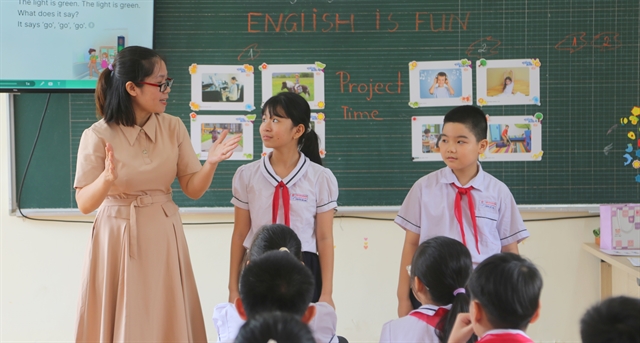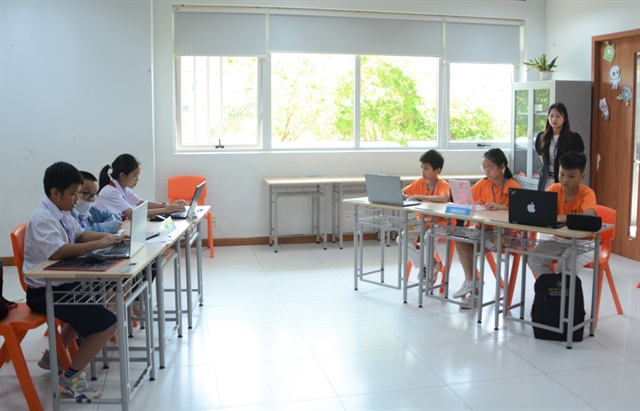 Society
Society

 |
| An English lesson at Nguyễn Văn Trỗi Primary School on Cát Hải Island in Hải Phòng City. — VNA/VNS Photo Minh Thu |
HÀ NỘI — Việt Nam aims to make English the second language in schools by 2045, a strategic direction aimed at enhancing international integration capabilities.
However, the general education system must overcome numerous challenges to achieve this goal, with teachers playing a vital role.
The programme roadmap consists of three phases: 2025-2030, 2030-2040 and 2040-2045, with seven evaluation criteria for each educational level.
Key tasks include raising social awareness, improving policies, training educators, designing the curriculum and teaching materials, innovating testing and evaluation methods, applying new technologies, strengthening international cooperation and social engagement, and promoting emulation and recognition.
The initiative will be rolled out across the entire education system with nearly 50,000 institutions, approximately 30 million students and one million teaching staff. Funding will come from the State budget as well as contributions from businesses, organisations and individuals.
According to the Ministry of Education and Training (MoET), this strategy requires English training for at least 200,000 teachers, along with 22,000 new recruits for the preschool and primary level, by 2030.
The MoET emphasised that the programme’s success requires public consensus and consistent implementation over 20 years to enhance national competitiveness and international integration.
From a subject to a second language
English currently remains a foreign language in Việt Nam’s general education system. Students from primary to high school study English as a subject, with three to four lessons per week on average.
While many schools offer extracurricular programmes or advanced classes in English, it remains just one of many subjects, rather than the second language on campus.
According to Programme Head of New Initiatives at RMIT University Việt Nam Jonny Western, a few international, bilingual or joint-education schools teach English as the medium of instruction (EMI). However, this number is far too small to meet nationwide demands.
Transitioning English from a ‘foreign language’ to a ‘second language’ will be a major turning point for education in Việt Nam.
The year 2035 is a reasonable milestone, which allows sufficient time to build the capacity of the teaching staff and narrow the educational gap between urban and rural areas.
In Southeast Asia, Singapore has used English as the primary language in education for several decades, while Malaysia has widely implemented EMI in science and technical subjects. The Philippines also considers English an official language, giving it a significant advantage in the global labour market.
For Việt Nam, making English the second language will increase opportunities and enhance workforce competitiveness.
However, experts believe that this transition is not simple. When English is simply a foreign language, the primary teaching goal is to develop communication skills. However, as the second language, English will serve as a medium of instruction in a variety of other subjects, from natural sciences and economics to social studies.
This change requires a comprehensive reform of the curriculum, teaching materials, instruction methods and especially the capabilities of the teaching staff.
Dr Jennifer Howard, RMIT University Việt Nam’s programme head of Foundation Studies, said that teachers would be the key factor in rolling out EMI.
An EMI teacher must not only be proficient in English, but also possess strong knowledge of their subject as well as modern teaching skills. They must adjust teaching materials and methods to accommodate varying English proficiency levels within a classroom, ensuring weaker students can keep up while stronger ones maximise their potential, Howard noted.
She also pointed out that in EMI, English would no longer be the goal, but an instrument to deliver knowledge. Teachers must therefore have the confidence to use academic English to explain complex concepts and effectively manage classroom interactions.
If teachers were limited to basic communication skills, students would struggle to absorb knowledge accurately and comprehensively, Howard explained.
 |
| Students participate in a debate using English in Đà Nẵng. — VNA/VNS Photo Văn Dũng |
Education researchers also warned that the rapid rollout of EMI could place significant financial pressure on schools and parents.
Additionally, the risk of commercialisation in education, particularly in international programmes labelled as EMI, could lead to inequalities in learning opportunities between urban and rural areas. Without strong monitoring, the quality of education could greatly fluctuate, eroding public trust.
To address these risks, experts have recommended developing a robust quality assurance system, alongside efforts in teacher training. This should include clear standards for language proficiency, professional qualifications and pedagogical effectiveness, along with regular evaluation and feedback mechanisms to help teachers continuously improve their skills.
Creating an academic environment that encourages the use of English in research and professional activities is also seen as a crucial factor in helping teachers maintain daily language practice.
Concerns to address
At a recent meeting of the National Council for Education and Workforce Development under the initiative, multiple concerns about implementation were raised with the MoET.
Nguyễn Quý Thanh, rector of the University of Education (under Việt Nam National University - Hà Nội), said that training English as a second language must be linked to fostering critical thinking, cultural receptivity and reflection, while encouraging rational thinking to create a meaningful transformation in education.
He also noted that the age range of four to seven years would be a ‘golden period’ for language learning, but introducing a foreign language too early might affect children’s proficiency in their native language and their ability to understand their own culture.
HCM City University of Education rector Huỳnh Văn Sơn said introducing English from the preschool level would be feasible, but cautioned against making the language mandatory. He also highlighted the need to anticipate possible counter impacts on native language learning and cultural identity.
Lâm Thế Hùng, deputy director of Tuyên Quang Province’s education and training department, also noted that carrying out the initiative in areas with large ethnic minority populations presented a significant challenge.
Despite focused investment, efforts to teach Vietnamese to ethnic minority children before they enter first grade had yet to yield satisfactory results. While many students could understand Vietnamese, their ability to express themselves remained limited. Against this backdrop, introducing English as a second language would become even more difficult.
This group of students, whose mother tongue is an ethnic language, must learn Vietnamese as they enter Grade 1.
Setting goals, timelines and outcome requirements that align with the conditions of each region therefore would be crucial, he stressed.
Acting director of Cần Thơ City’s education and training department Trần Thị Huyền agreed, adding that schools welcomed the initiative to make English a second language, but tailoring the roadmap to each locality was necessary to ensure effective and consistent implementation.
Comprehensive solutions
In response to the concerns raised by educators and education managers, Deputy Minister of Education and Training Phạm Ngọc Thưởng underscored a flexible roadmap for the initiative through 2045.
Regions with favourable conditions could pioneer and set an example, while more disadvantaged areas could progress at an appropriate pace. The roadmap should also include phased implementation, starting with preschools and gradually expanding to primary and higher education levels.
The deputy minister also noted that the Government should take the lead by prioritising public investment while encouraging social contributions.
The effort to make English a second language must align with the Politburo’s direction, which calls for groundbreaking thinking, awareness, policies and resources, he said.
Thưởng also emphasised the role of institutional reform and teacher training. Updating teacher training programmes and providing fair incentives, especially to those who teach English or use English as a medium in science subjects, was an urgent demand.
He highlighted the role of technology and artificial intelligence in language teaching and learning, as well as the need for initiatives that inspire enthusiasm for studying English. These could include sharing and scaling successful models from localities and educational institutions, he said.
“We hope that this initiative will soon be approved with high feasibility and effective management, particularly at the local level, to help each educational institution achieve the set goals,” the deputy minister said. — VNS




